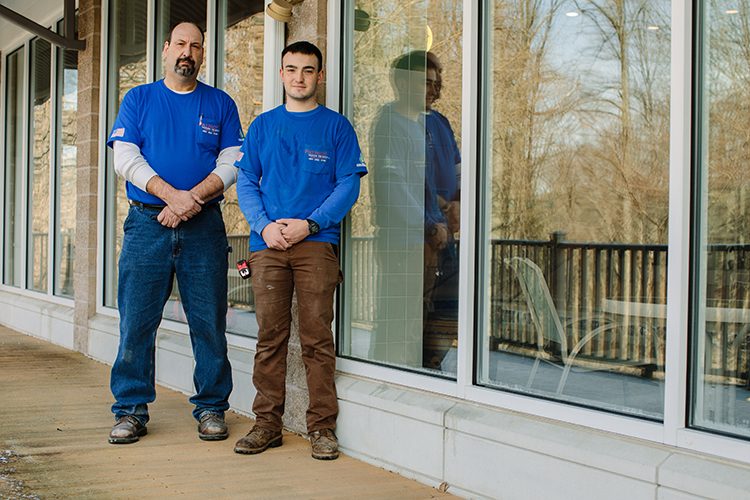Reflections
I’m thankful for how far our team has come, how much we’ve grown together and how much each of them has grown as individuals.

I was sitting in my living room late last month, weighed down by my third helping of our holiday meal. I looked at the Christmas tree. The carpet beneath it was vacant, where only a few hours earlier, there’d been a Sprinter van load of carefully wrapped gifts. The kids and grandkids had seen to that.
Everyone had gone home, and I was left with my thoughts, which inevitably turned to work — but not tasks that needed completion. Instead, I considered how thankful I was and am. I’m thankful for my family, friends, and my country for the security we have here. Equally, I’m thankful for the trades and the life I’ve built because of this industry.
We tend to lose sight of this during the chaos of the workdays that turn into months and, eventually, years. After enough of those years, we call it a career. The skilled trades — for me, hydronics — have given me the tools to forge the life I live now and the life two of my children are forging within the same industry.
There’s certainly been no shortage of hard work and setbacks, but what the trade provided for me was opportunity. For that, I’m grateful.
I’m thankful for how far our team has come, how much we’ve grown together and how much each of them has grown as individuals. And I’m thankful for all the outstanding people I’ve met. Being thankful for where we are and what we’ve accomplished is extremely important.
Invest in Their Future
This trade has given me so much, and with increasing frequency, I find myself wondering, “How can I give back?” Maybe you have similar thoughts.
Then it came to me. The best way I can think of to give back to this trade is by providing opportunities for young people to flourish. And not simply by hiring young people but by making an investment in them. We do this by actively attracting, encouraging, teaching and mentoring them. In this way, we provide more than a job. We provide opportunities for them while ensuring the future of our industry.
Teach them to fish, so to speak, so that one day they, too, can become fishing instructors.
I look at how the trades have been maligned, dare I say demonized, by the educational system and by our culture in recent decades. How many young people graduate with a four-year degree without job prospects in their sector? Plenty. Fewer opportunities are available for them in many “higher-education” career paths while our industry is starving for talent.
It’s too easy to blame the school systems: “Teachers push kids toward college.” It’s easy to blame the kids: “They’re lazy; all they want to do is make TikToks and Snapchat each other all day.”
There’s certainly some truth on both accounts, but to blame everyone but ourselves is nearsighted. We need to shoulder at least some of the blame.
People born before the Blackberry was invented are different from those born after. I’m painting with a broad brush here, but it’s true in some ways. Many young people don’t necessarily view problems, work and relationships the same way older people do. Each generation grew up in a different world and, thanks to technology, society has never changed as quickly as it is now.
I’ve come to realize that helping young people succeed in this business requires those of us in management positions to practice a little compassion, understanding and forgiveness. In my experience, the younger crowd doesn’t take the initiative as quickly as we wish they would. Whether they know it or not, they need more direction.
On the flip side of the coin, young workers have their strong suits, too. They’ll adapt to all computer systems quickly, whether that be inventory management software, dispatching programs, combustion analyzers, sales software, etc. If you’re impressed with their tech savvy, let them know. Go out of your way to show them how they contribute to the team. It’ll mean a lot. Encourage them. You’ll likely give them some negative feedback throughout the workweek, so balance it with some praise, but only if it’s genuine.
I like to show young hires the “big picture.” I send them out with service techs, installers, system designers, etc. You don’t know what they’ll blossom into, but they must understand that if they’re not enamored with one side of the business, there are other options. And if they want to explore those options, you should permit them to do so.
Once you’ve learned a young hire’s strengths and weaknesses, be sure to give some thought to who you send them out with. Who can they learn the most from, and who do you think they’ll enjoy working under?
No doubt a few of you snickered at that last line. “Enjoy?! This is work!”
Yes, it is work. It’s where we spend a massive chunk of our adult lives. Millennials and Gen Z place more value on the enjoyment of their work and “being a part of something bigger” than boomers do. Company culture means as much to them as the pay, especially in the long term.
If they don’t enjoy their first two weeks, you’ve lost them, especially if they’re still living with their parents and a paycheck isn’t the difference between dinner and going to bed hungry. And if you know anything about people in their early- to mid-20s, you know this is the majority. And who can blame them, with current home prices, mortgage interest rates and cost of rent?
Take an Active Recruiting Role
We all complain that we don’t have people coming into the labor force. However, do we have a right to complain if we haven’t taken a role in recruiting and building that force? It’s like growing a garden. We need to seed it, water it and fertilize it to get a yield. Taking an active role and supporting the next generation is how we get quality people.
Not all new recruits will survive, but if you understand how to deal with them, more will make it than you think.
As I reflect on where I am now, where I’ve been and the jobs I’ve held, I think about the jobs I’ve detested and those I’ve loved. Without fail, I hated positions where my boss was mean when it was obvious he was simply taking out his frustrations on the people below them. Make sure that’s not you.
Despite the chaos, we need to be thankful for what we have and lead people into opportunities where they can be thankful, too. l
Tom Soukup is the principal of Patriot Water Works Co., with more than 20 years as a hydronic designer and installer. Reach Tom at twsoukup@patriotwaterworks.com.





